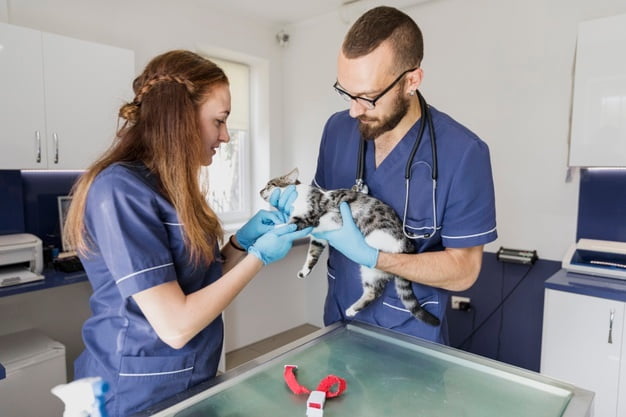The most popular degree program in veterinary medicine is the Doctor of Veterinary Medicine or DVM program. It is a fully accredited, rigorous four-year program in veterinary medicine. The veterinary programs offered in top-tier veterinary schools in the U.S. and Canada are highly competitive, and many deserving applicants are turned away due to a shortage of places. In such a scenario, Caribbean veterinary schools offer rolling admission, which means that they don’t have just one incoming class each year. Plus, veterinary schools in the Caribbean are among the best medical colleges.
The DVM program comprises a well-designed veterinary basic science curriculum to build a strong foundation that allows veterinary students to hone advanced technical knowledge offered later in the clinical years. During the first seven semesters of the DVM program, the focus remains on building theoretical and clinical skills that will be instrumental in becoming a well-qualified and trained veterinarian.
Click here – Is A Boiler Repair Possible, Or Should You Replace It?
Importance of Basic Science Curriculum in Veterinary medicine
Basic science course is an important aspect of veterinary medicine as it offers veterinary students the opportunity to develop extensive knowledge in order to prepare them for a successful career in veterinary medicine through on-campus teaching and clinical training at animal hospitals.
The basic science curriculum is designed to allow students to progressively build knowledge of different topics of veterinary medicine throughout the seven semesters. Here is a list of basic science topics in the DVM program:
Semester 1
- Veterinary Histology and Embryology
- Veterinary Immunology
- Veterinary Anatomy I
- Veterinary Physiology I
- Professional Development I
Semester 2
- Veterinary Bacteriology and Mycology
- Veterinary Parasitology
- Veterinary Physiology II
- Veterinary Anatomy II
Semester 3
- Veterinary Public Health/Epidemiology
- Veterinary Virology
- Animal Welfare Behaviour
- Veterinary Pharmacology I
- Veterinary Pathology I
- Veterinary Clinical Skills I
- Professional Development II
Semester 4
- Veterinary Pathology II
- Veterinary Pharmacology II
- Veterinary Ethics and Communication
- Veterinary Clinical Skill II
- Veterinary Clinical Pathology
Semester 5
- Veterinary Diagnostic Imaging
- Veterinary Clinical Nutrition
- Veterinary Toxicology
- Veterinary Anesthesiology
- Principles of Veterinary Surgery
- Theriogenology
Semester 6
- Small Animal Medicine
- Exotic Companion Animal Medicine
- Veterinary Clinical Skills III
- Food Animal Medicine and Surgery
Semester 7
- Small Animal Surgery
- Small Animal Medicine II
- Professional development III
- Large Animal Medicine and Surgery
All the best medical schools in the Caribbean follow this basic science curriculum.
Click here – Things To Consider Before Buying An Air Filter
Prepares for NAVLE
The North American Veterinary Licensing Examination (NAVLE) is a standardized licensing examination administered by ICVA. Veterinary medicine graduates must pass this examination to earn licensure for practising veterinary medicine in the U.S. and Canada. The NAVLE exam comprises 360 multiple-choice questions and lasts for 7.5 hours duration. Throughout the veterinary program and especially during the basic science years, veterinary schools provide special teaching to boost NAVLE preparations.
If you are looking for a well-designed Doctor of Veterinary Medicine program, check out accreditated Caribbean veterinary schools. The DVM program at Caribbean veterinary schools carefully integrates the basic science course and clinical years to ensure the development of future veterinarians. So, take the next step and apply for the DVM program to kick-start your journey toward becoming a well-trained veterinarian!






